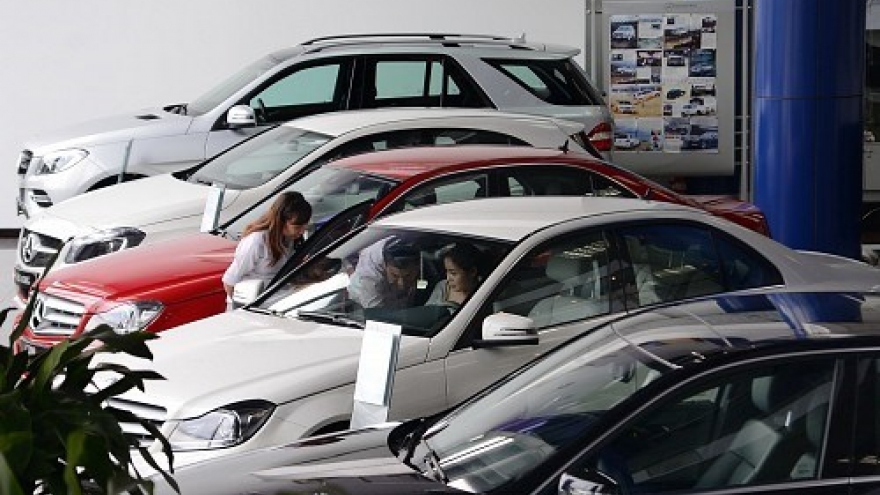On July 1 the tax on cars with engines of less than 1.5 liters will drop from 45% to 40%. It will go down further to 35% in 2018.
Thaco, which controls nearly 45% of the Vietnamese market, plans to invest VND30.11 trillion (US$1.33 billion) to expand its manufacturing and retail activities over the next three years.
It will spend two-thirds on two new lines in its manufacturing base in the central province of Quang Nam.
One of them will be able to annually churn out 100,000 units of Mazda 2, Mazda 3, and CX3 for the Japanese automaker. The first two models have engines of less than 1.5 liters
Its current Mazda plant has a capacity of 25,000 units.
The other plant will make trucks and buses and also have a capacity of 100,000 units.
Thaco also plans to expand its retail and showroom network.
It expects sales to rise by 40 percent to more than 112,000 units and VND71.73 trillion (US$3.17 billion) this year. Its sales had risen by 90% last year.
The rates on cars with engines of 1.5-2.5 liters will remain unchanged at 45-50%.
But for vehicles with engines of 2.5-3 liters, it will rise from 50% to 55%, while for those above three liters, it will rise sharply to 90-150%.
Hyundai Thanh Cong, which assembles and imports Hyundai cars, has completed construction of the first stage of a plant in the northern Ninh Binh Province and accelerated work on the second.
The factory assembles small cars like the Huyndai i10 and Huyndai i20.
Another reason for the expansion by automakers is the increasing demand in Vietnam, industry insiders said.
Rapid urbanization and rising incomes allow more Vietnamese to afford the comfort and safety of a car, they said.
Auto sales between January and May soared 31% to 111,4000 units, according to the Vietnam Automobile Manufacturers Association (VAMA).
Toyota, Mercedes-Benz, Ford and Honda reported solid increases.
The number of households in Vietnam with financial assets of US$100,000 to US$2 million would soon be among the fastest growing in the world, fuelling luxury vehicle sales in a country where gross domestic product per capita is still only about US$1,500, Reuters quoted the Economist Intelligence Unit as saying.
Sales of small cars are expected to increase sharply when the new tax amendments take effect, cutting the prices of cars with engines smaller than 1.5 liters by up to US$1,000 each. Popular small cars like Huyndai i10 and i20, Kia Morning, Toyota Vios, Ford Fiesta and Mazda2 currently cost VND300-700 million in Vietnam.
The cars will become even cheaper from January 1, 2018, when the tax is cut further to 35% and tariffs on cars imported from ASEAN members are scrapped.
Vietnam mainly imports small cars like the Mitsubishi Attrage and Mirage and Toyota Yaris from Thailand.
Many importers have already moved to capitalize on the new policy. Euro Auto, which imports and distributes BMW cars, recently unveiled a new 1.5-liter seven-seat car.
At their recent auto shows, Mercedes Benz and Audi have displayed many small cars, hoping to expand their market share in the segment in the coming time.
The market share of small cars would soon exceed 50%, industry insiders said.
Continued growth
Vietnam is enjoying a surge in interest among automobile makers as sales saw a record growth of 55% last year, following growths of 35% and 23% the previous two years.
Sales growth will continue to be strong this year, albeit slightly slower than in the last few years, according to industry insiders.
BMW AG said its car sales in Vietnam are expanding at the fastest pace in Southeast Asia as the nation’s economic growth spurs demand.
The company estimates sales to grow at 30-40% through 2017, Bloomberg quoted Axel Pannes, managing director of BMW Group Asia, who heads 13 Asian markets, as saying.
BMW said it sold just over 1,500 cars last year in Vietnam, which it entered in 1993 and has been its top growth market in Southeast Asia for the last few years.
“It’s always depending on the political situation that’s quite volatile in some of the markets, but at the moment I’m very positive about Vietnam,” Pannes said in a recent interview, referring to the markets under his charge.
Assuming Vietnam remains stable, he said, “I would see continuous double-digit growth.”
Bui Kim Pha, deputy CEO of Truong Hai Auto Corporation, said the market is stabilizing and so its growth would not be as high as last year when sales saw a six-year high of nearly 245,000 units.
Mercedes-Benz Vietnam plans to invest 11 million euros (US$12.2 million) this year to set up two new assembly lines, according to Dirk Adelmann, its sales director.
The company sold 3,600 units last year, its 20th in Vietnam. A 50% growth meant Vietnam was one of Mercedes-Benz’s five fastest growing markets in the world, Adelmann said.
Rolls-Royce and Bentley recently opened their first dealerships in Vietnam.
Car makers’ positive outlook for Vietnam comes as the government targets economic growth of 6.7% this year, industry insiders said.



